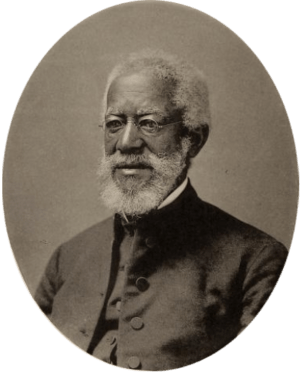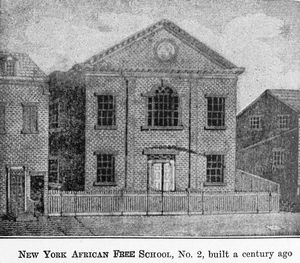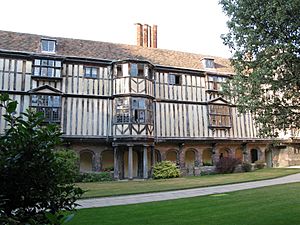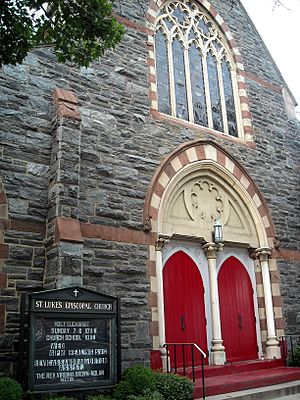Alexander Crummell facts for kids
Quick facts for kids
The Reverend
Alexander Crummell
|
|
|---|---|
 |
|
| Born | March 3, 1819 New York City, New York, U.S.
|
| Died | September 10, 1898 (aged 79) Red Bank, New Jersey, U.S.
|
| Education | Noyes Academy Oneida Institute Queens' College, Cambridge |
| Occupation | Minister, Professor |
| Religion | Episcopal |
Alexander Crummell (born March 3, 1819 – died September 10, 1898) was an important African-American minister, teacher, and leader. He was one of the first people to support the idea of pan-Africanism. This idea suggests that all people of African descent, no matter where they live, should work together.
Crummell became an Episcopal priest in the United States. In the late 1840s, he traveled to England to raise money for his church. While there, he gave talks about slavery in America. People who wanted to end slavery helped him study at Cambridge University. He was the first Black student officially recorded to graduate from Cambridge.
In 1853, Crummell moved to Liberia, a country in Africa. He wanted to teach and convert Africans to Christianity. He also hoped to convince African Americans to move to Africa to help build a strong society. Crummell lived in Liberia for 20 years. He tried to get more American Black people to join him, but not many did.
After returning to the United States in 1872, Crummell became a pastor in Washington, DC. In 1875, he and his church members started St. Luke's Episcopal Church. This was the first independent Black Episcopal church in the city. Crummell led the church until he retired in 1894.
Contents
Early Life and Education
Alexander Crummell was born in 1819 in New York City. His mother, Charity Hicks, was a free woman of color. His father, Boston Crummell, was a former slave. Alexander's grandfather was from the Temne group in what is now Sierra Leone. He was captured and sold into slavery when he was about 13 years old.
Both of Crummell's parents were active abolitionists. Abolitionists were people who worked to end slavery. Their home was even used to print the first African-American newspaper, called Freedom's Journal. Crummell's father taught him to feel connected to Africans living in Africa. These early experiences shaped Crummell's beliefs and actions throughout his life. Even as a boy, Crummell worked for the American Anti-Slavery Society.

Crummell started school at the African Free School No. 2. He also had private teachers at home. Other important African-American leaders, like James McCune Smith and Henry Highland Garnet, also went to this school. After graduating, Crummell and his friend Garnet attended the new Noyes Academy in New Hampshire. Sadly, a group of people who were against Black students attacked and destroyed the school.
Crummell then went to the Oneida Institute in central New York. This school was a center for the abolitionist movement. While there, Crummell decided he wanted to become an Episcopal priest. He was a bright young man. In 1840, he was the main speaker at the anti-slavery New York State Convention of Negroes in Albany.
Crummell was not allowed into the General Theological Seminary in New York City because he was Black. But he continued his studies and became a priest in 1842 in Massachusetts. However, he soon found it was hard for Black priests to find work. He struggled with low attendance at his church in Providence, Rhode Island.
He traveled to Philadelphia to ask the bishop there for a larger church. Philadelphia had a large community of free Black people. Bishop Onderdonk told him, "I will let you join my church area on one condition: No Black priest can sit in my church meetings, and no Black church can ask for a representative there." Crummell thought for a moment and replied, "I will never join your church area under those terms."
Career
Studies and Talks in England

In 1847, Crummell went to England. He wanted to raise money for his church, the Church of the Messiah. While in England, Crummell preached and spoke about the fight against slavery in the United States. He raised almost $2,000.
From 1849 to 1853, Crummell studied at Queens' College, Cambridge. Important people like William Wilberforce helped him. Crummell had to take his final exams twice, but he earned his degree. He became the first Black student officially recorded to graduate from Cambridge University.
While at Cambridge, Crummell met other abolitionists. He continued to travel around Britain, speaking out against slavery and the difficulties faced by Black people. During this time, Crummell developed his idea of Pan-Africanism. This became his main belief for helping the African race move forward.
Crummell believed that all people of African descent, including those in the Americas, the West Indies, and Africa, needed to unite. He thought that working together as a race could solve problems like slavery, discrimination, and attacks against Black people. He decided to move to Africa to share his message.
Working in Liberia
Crummell arrived in Liberia in 1853. At this time, Americo-Liberians, who were free Black people from America, had started to govern the country. Crummell came as a missionary for the American Episcopal Church. His goal was to convert native Africans to Christianity. Even though Crummell had been against the idea of colonization before, his experiences in Liberia changed his mind. He began to believe in a "civilizing mission."
Crummell started to preach that "enlightened" (meaning Christianized) Black people from the United States and the West Indies had a duty to go to Africa. There, they would help to civilize and Christianize the continent. He believed that once enough native Africans were converted, they would take over. Then, those from the Western world would focus on educating the people and running a republican government.
Crummell had a big impact on Liberian intellectual and religious life. He was a preacher, a thinker, and an educator. He believed Africa had a special role in God's plan and had great moral and religious potential. However, Crummell's big plan never fully came true. Most Black Americans were more interested in gaining equal rights in the United States than moving to Africa. While Crummell was a successful pastor and professor in Liberia, he couldn't create the society he imagined. In 1873, he feared for his life from the Americo-Liberian leaders, so he returned to the United States.
Return to the United States
When he returned, Crummell became the pastor for St. Mary's Episcopal Mission in Washington, DC. This area, called Foggy Bottom, was mostly a working-class Black neighborhood. In 1875, he and his church members started St. Luke's Episcopal Church. This was the first independent Black Episcopal church in the city.
They raised money to build a new church. Construction began in 1876, and they celebrated Thanksgiving in their new church in 1879. Crummell served as the leader at St. Luke's until he retired in 1894. The church was recognized as a National Historic Landmark in 1976. Crummell also taught at Howard University from 1895 to 1897.
Even with challenges, Crummell never stopped working for racial unity. He believed in black nationalism, which means Black people working together to build their own communities. He also supported self-help and separate economic development for Black communities. In his last years, he founded the American Negro Academy. This was the first organization to support African-American scholars. It opened in 1897 in Washington, DC. Alexander Crummell died in Red Bank, New Jersey, in 1898.
Influence
Crummell was an important voice in the movement to end slavery. He was also a key leader in the Pan-African idea. Crummell's impact can be seen in his own achievements. He also influenced other Black leaders and Pan-Africanists, such as Marcus Garvey and W. E. B. Du Bois. Du Bois honored Crummell with a famous essay called "Of Alexander Crummell." This essay was in his 1903 book, The Souls of Black Folk.
In 2002, the scholar Molefi Kete Asante included Alexander Crummell on his list of the 100 Greatest African Americans.
Legacy and Honors
Crummell's personal papers are kept at the Schomburg Center for Research in Black Culture in Harlem, New York. The Alexander Crummell School in Washington, DC, was named after him. Crummell is also mentioned on a New Hampshire historical marker (number 246) that remembers Noyes Academy in Canaan, New Hampshire.
In 2021, Queens' College, Cambridge started the Alexander Crummell Scholarships. These scholarships help students from disadvantaged backgrounds or those who are not often seen at Cambridge University. A picture of Crummell is displayed in the President's Lodge at Queens' College. A street in Annapolis, Maryland, is also named after him.
Veneration
Crummell is honored with a special day on the liturgical calendar of the Episcopal Church (USA) on September 10.
Writings
- The future of Africa: being addresses, sermons, etc., etc., delivered in the Republic of Liberia
See also
- National Afro-American League, set up in 1890 and based on racial solidarity and self-help
- Black separatism, as distinguished from black nationalism
 | James B. Knighten |
 | Azellia White |
 | Willa Brown |


